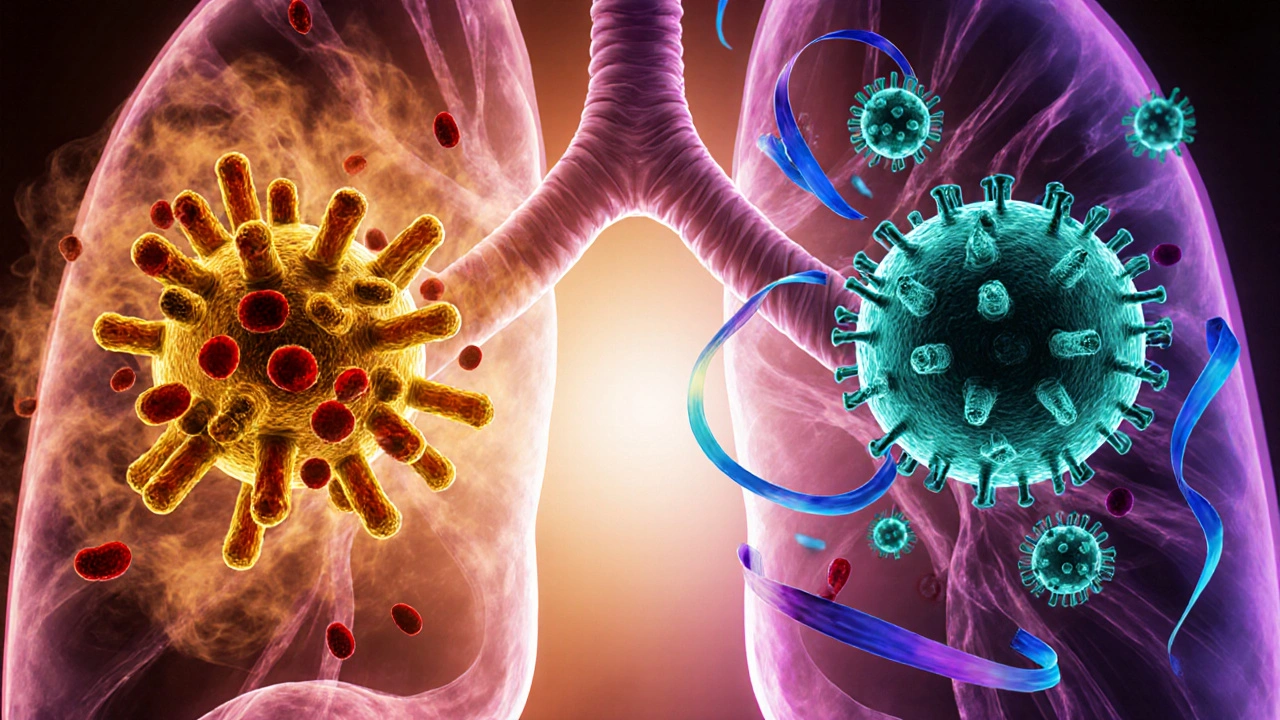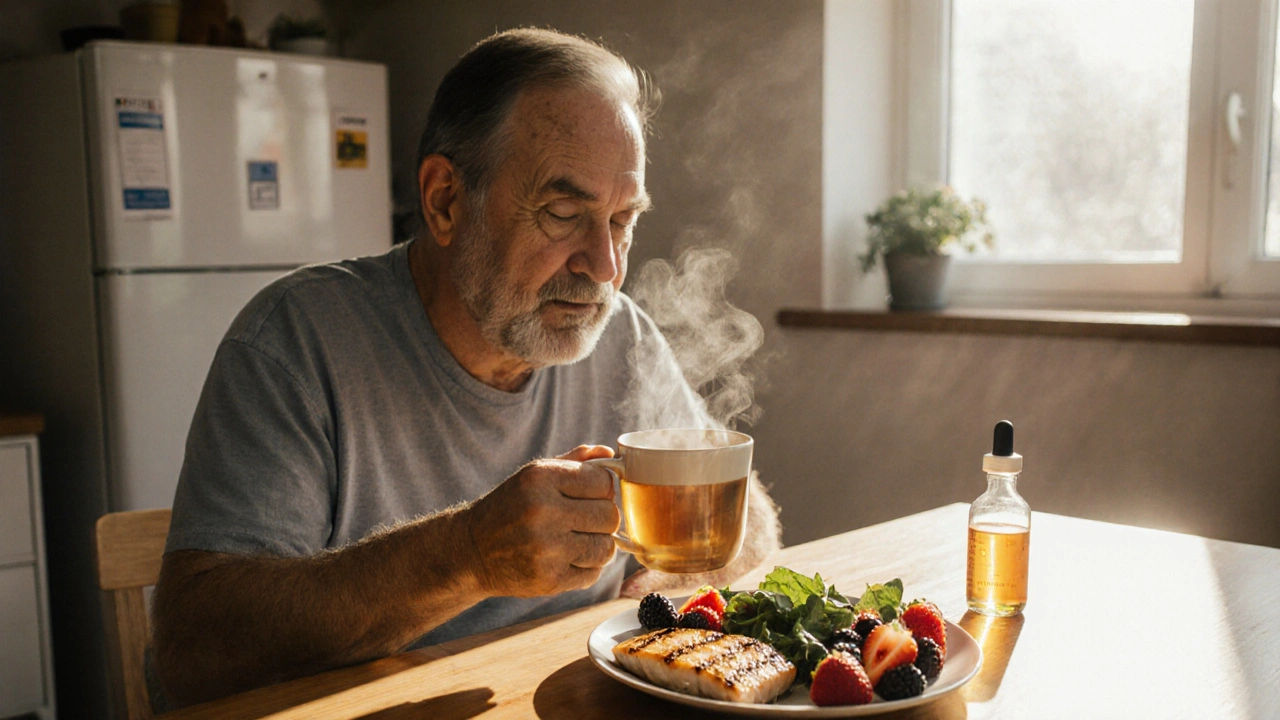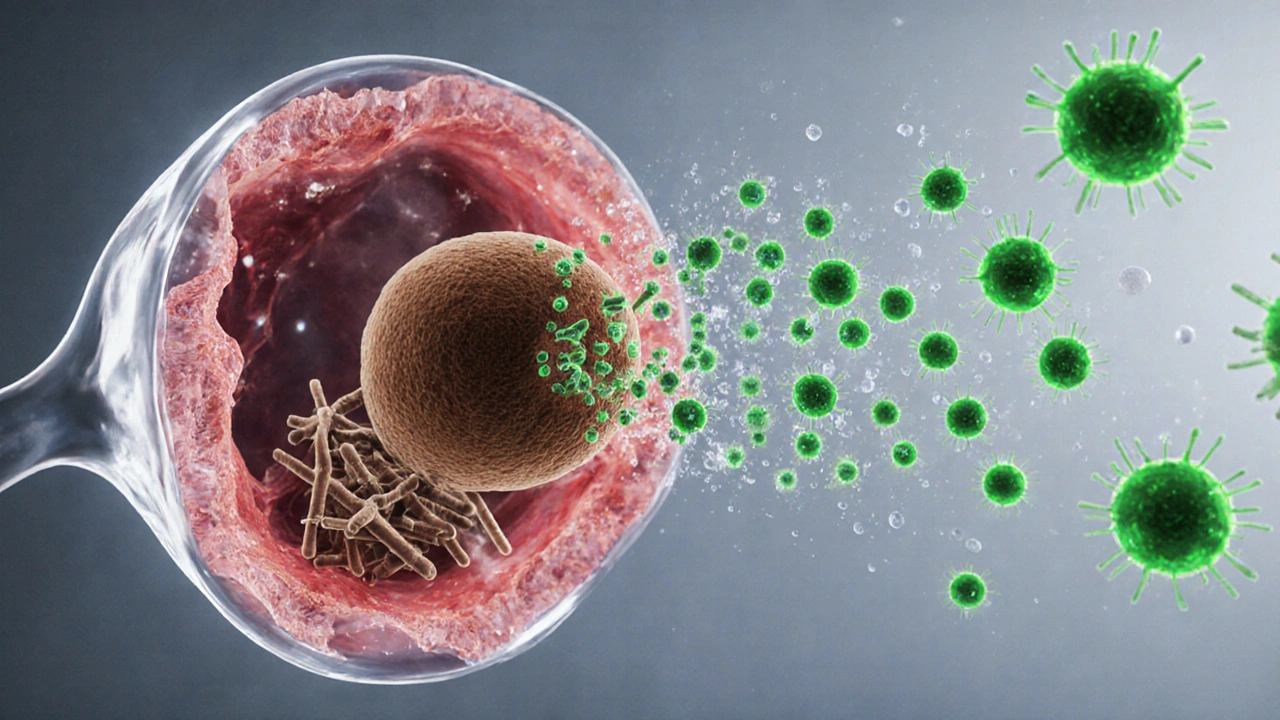Pneumonia Recovery Timeline Calculator
Recovery Time Estimator
Estimate your immune system recovery timeline based on key factors mentioned in the article. This tool provides general guidance only.
Your Recovery Factors
When pneumonia strikes, it does more than fill your lungs with fluid - it shakes up the whole body’s defence network. Understanding how this common respiratory infection messes with the immune system helps you spot warning signs early, choose the right treatment, and boost recovery.
Pneumonia is a lung infection that inflames the air sacs, which may fill with fluid or pus. It can be caused by bacteria, viruses, fungi or even inhaled chemicals. While most people think of a cough and fever, the real battle happens at the cellular level, where immune cells scramble to clear the invader.
What Happens Inside the Lungs?
Once a pathogen reaches the lower respiratory tract, alveolar macrophages - the first‑line sentinels - try to engulf and destroy it. If the pathogen overwhelms them, they release signalling proteins called cytokines. These molecules call in neutrophils, a type of white blood cell that swarms to the site, releasing enzymes that break down bacterial walls.
Macrophage a large phagocytic cell that engulfs microbes and debris in the lungs and Neutrophil a fast‑acting white blood cell that attacks bacteria are the heavy‑hitters in early pneumonia defence. When they work together, the infection can be cleared in days. When they don’t, the immune response can go haywire.
Bacterial vs. Viral Pneumonia: Different Triggers, Different Immune Reactions
| Aspect | Bacterial Pneumonia | Viral Pneumonia |
|---|---|---|
| Primary pathogen | Streptococcus pneumoniae (most common) | Influenza virus or Respiratory syncytial virus (RSV) |
| Immune trigger | Strong neutrophil response, high cytokine release | Interferon‑mediated antiviral state, lymphocyte activation |
| Typical blood test pattern | Elevated white blood cell count, especially neutrophils | Normal or mildly raised white cells, increased lymphocytes |
| Risk of cytokine storm | Moderate - usually localized inflammation | Higher - especially with influenza or COVID‑19 co‑infection |
| Treatment impact on immunity | Antibiotics reduce bacterial load, allowing immune cells to finish the job | Antivirals (when available) curb replication; otherwise immune system bears the brunt |

How Pneumonia Weakens the Immune System
Even after the lungs clear most of the invader, the immune system can stay suppressed for weeks. Here’s why:
- Exhausted immune cells: Continuous activation drains energy stores in macrophages and neutrophils, reducing their ability to respond to new threats.
- Altered cytokine balance: Pro‑inflammatory cytokines (like IL‑6 and TNF‑α) stay elevated, while anti‑inflammatory signals (IL‑10) may overshoot, creating a “confused” environment.
- Secondary infections: A weakened airway lining makes it easier for bacteria such as Haemophilus influenzae to colonise, leading to bronchitis or a new bout of pneumonia.
People with chronic conditions - diabetes, COPD, or heart disease - feel these effects more sharply because their baseline immune function is already compromised.
Risk Factors That Amplify Immune Disruption
Not everyone who catches pneumonia suffers lasting immune issues. Certain factors raise the odds:
- Age: Children under 2 and adults over 65 have less robust immune surveillance.
- Smoking: Inhaled toxins damage cilia, the tiny hairs that sweep microbes out of the airways, and impair macrophage function.
- Alcohol misuse: Alcohol suppresses neutrophil activity and reduces the production of vital cytokines.
- Immunosuppressive therapy: Steroids, chemotherapy, or biologics blunt the whole immune cascade.
- Poor nutrition: Deficiencies in vitaminC, zinc, or protein starve immune cells of the building blocks they need.
Addressing these lifestyle variables not only helps you recover faster but also restores immune resilience for future challenges.
Boosting Your Immune System During and After Pneumonia
Medical treatment is the first line of defense - antibiotics for bacterial forms, antivirals for specific viral strains, and oxygen support if oxygen levels dip. But the body’s own immune machinery benefits from supportive measures.
- Hydration: Fluids thin mucus, making it easier for cilia and macrophages to clear debris.
- Balanced diet: Aim for 1‑2g of protein per kilogram of body weight daily, plus plenty of fruits and vegetables rich in antioxidants (berries, leafy greens).
- Targeted supplements: VitaminD (800‑1,000IU/day) has been shown in several 2023‑24 trials to reduce respiratory infection severity. Zinc lozenges (15mg) can shorten symptom duration.
- Gentle breathing exercises: Techniques like diaphragmatic breathing improve alveolar ventilation, supporting macrophage activity.
- Vaccination: Staying up‑to‑date with the pneumococcal vaccine (PCV20) and annual flu shot cuts the chance of getting pneumonia in the first place, lessening the immune hit.
These steps are especially crucial during the recovery window - roughly two weeks after symptoms fade - when the immune system is still rebooting.

When to Seek Professional Help Again
Even after a seemingly successful treatment, watch for red flags that suggest lingering immune trouble:
- Fever returning after a period of normal temperature.
- New cough producing coloured sputum.
- Unexplained fatigue lasting more than three weeks.
- Sudden shortness of breath with minor exertion.
If any of these appear, a follow‑up chest X‑ray, sputum culture, or blood work measuring C‑reactive protein (CRP) can catch a secondary infection early.
Putting It All Together - A Quick Checklist
- Identify pneumonia type (bacterial vs. viral) - guides treatment and predicts immune impact.
- Monitor white blood cell trends; a lingering neutrophil surge may signal ongoing inflammation.
- Support immune recovery with nutrition, hydration, and targeted vitamins.
- Quit smoking and limit alcohol to restore ciliary function.
- Get vaccinated against Streptococcus pneumoniae and seasonal flu.
- Watch for post‑pneumonia warning signs and seek medical review promptly.
Frequently Asked Questions
Can pneumonia cause a permanent damage to the immune system?
Most people recover fully, but severe or repeated episodes can lead to chronic inflammation that dulls immune responsiveness. Maintaining good lung health and avoiding risk factors helps prevent long‑term decline.
What’s the difference between a cough after pneumonia and a new infection?
A lingering dry cough is common for up to six weeks as airway irritation heals. A productive cough with green or blood‑tinged sputum, especially if fever returns, likely signals a secondary bacterial infection.
Are there specific foods that help restore immune function after pneumonia?
Foods rich in vitaminC (citrus, kiwi), vitaminD (fatty fish, fortified dairy), zinc (legumes, nuts), and protein (lean meat, eggs, beans) provide the nutrients immune cells need to rebuild and function efficiently.
How long does it take for the immune system to bounce back after pneumonia?
Recovery varies, but most healthy adults regain baseline immunity within two to three weeks. Older adults or those with comorbidities may need a month or more, especially if they experienced a severe infection.
Should I take antibiotics if I have a viral pneumonia?
No. Antibiotics target bacteria and won’t affect viruses. However, doctors sometimes prescribe them prophylactically if they suspect a secondary bacterial infection could develop.

Gena Thornton
October 12, 2025 AT 05:51When pneumonia hits, the first wave of immune cells-macrophages and neutrophils-rush to the alveoli, trying to engulf the invading microbes. The onslaught triggers a cascade of cytokines that can overshoot, leaving the immune system temporarily exhausted. This exhaustion shows up as reduced white‑cell responsiveness and a lag in handling new pathogens. Lifestyle factors like smoking or alcohol amplify the depletion, meaning the recovery window can stretch beyond the visible symptom phase. Supporting the body with protein, hydration, and targeted vitamins helps redraw the immune baseline faster.
Lynnett Winget
October 18, 2025 AT 14:38That’s a solid rundown! I love how you broke down the cellular scramble into easy‑to‑follow steps, especially the bit about cytokine overload. Adding a splash of colorful metaphor really paints the picture for folks who aren’t used to immunology jargon. Keep the practical tips coming-you’ve got the right vibe.
Jordan Schwartz
October 24, 2025 AT 23:24Understanding that the immune system stays a bit muted for weeks after symptoms subside can change how we plan our week. A gentle walk, breathing exercises, and a protein‑rich smoothie each morning give those tired macrophages a chance to refuel. Monitoring energy levels rather than pushing for full gym sessions prevents a relapse. Stay mindful of any fever spikes; they often signal a lingering infection.
Nitin Chauhan
October 31, 2025 AT 07:11Stay hydrated and move gently
Angelo Truglio
November 6, 2025 AT 15:58Wow-another article trying to dress up basic biology in a fancy suit!!! It’s obvious that pneumonia isn’t just a cough, it’s a full‑blown assault on every defense line-macrophages, neutrophils, cytokines-all screaming for attention!!! Yet the “quick fix” mentality keeps popping up like popcorn, ignoring the deeper systemic fatigue. People need to realize that this isn’t a Netflix binge you can snap out of; it’s a marathon of immune repair!!!
Dawn Midnight
November 13, 2025 AT 00:44The phrase “full‑blown assault on every defense line” should be hyphenated, and “people need to realize” would read better as “people need to realize that”.
frank hofman
November 19, 2025 AT 09:31i dont think ppl realize how much u can screw up ur immune system after pneuomonia lol 😂 it's like u think once ur done coughing u’re good 2go but nahhh the body still kinda lazy rn
Dannii Willis
November 25, 2025 AT 18:18Interesting point, Frank. While the informal tone makes it relatable, the underlying message about lingering immune fatigue is spot‑on. It’s good to remind everyone that recovery isn’t just about symptom disappearance.
Robyn Du Plooy
December 2, 2025 AT 03:04From a pathophysiological perspective, the post‑pneumonic immunomodulatory phase involves a transient alteration in the Th1/Th2 cytokine axis, resulting in an immunosuppressive milieu that predisposes to opportunistic colonization. Clinically, this manifests as a subclinical decline in innate immune surveillance, measurable via reduced neutrophil oxidative burst assays. Integrating adjunctive nutraceuticals that modulate NF‑κB signaling can theoretically expedite the re‑establishment of homeostasis.
Boyd Mardis
December 8, 2025 AT 11:51The immune lag is real, and ignoring it is a recipe for disaster. Boost with zinc and vitamin D, and you’ll see the difference.
ayan majumdar
December 14, 2025 AT 20:38Yo, just keep an eye on that lingering cough.
Johnpaul Chukwuebuka
December 21, 2025 AT 05:24Good advice, ayan. A short cough can be normal, but if it stays longer, see a doctor.
Xavier Hernandez
December 27, 2025 AT 14:11We have a moral duty to protect our lungs and, by extension, our community; neglecting simple steps like vaccination is not just selfish, it's a betrayal of collective health.
Catherine Mihaljevic
January 2, 2026 AT 22:58Surely the pharma push for vaccines is just about profit, not health-there's hidden agenda behind every study.
Justyne Walsh
January 9, 2026 AT 07:44Ah yes, because the only reason anyone ever got a vaccine was to line someone's pockets. Thanks for the enlightening perspective.
Callum Smyth
January 15, 2026 AT 16:31Let’s keep the focus on actionable steps: finish the vaccine series, maintain a balanced diet, and incorporate light aerobic activity daily. Small, consistent habits build a resilient immune system over time.
Amy Hamilton
January 22, 2026 AT 01:18When we examine pneumonia through a philosophical lens, we recognize it as a reminder of the body's inherent vulnerability and its capacity for regeneration. The acute inflammatory response, while seemingly violent, is in fact a disciplined orchestration of cellular actors striving to restore equilibrium. Each macrophage that engulfs a pathogen represents a tiny act of sacrifice, echoing larger existential themes of duty and self‑lessness. Yet, after the battle, the immune system often enters a state of exhaustion, mirroring the human experience of post‑traumatic fatigue. This period of suppressed immunity invites us to contemplate the importance of rest, both physiological and metaphysical. Nutrition becomes a form of stewardship, providing the amino acids and micronutrients essential for repair, much like nurturing the soul with knowledge. Vitamin D and zinc, highlighted in recent trials, serve as catalysts that accelerate the rebalancing of cytokine networks. Hydration, though simple, ensures that mucosal barriers remain pliable, preventing secondary invasions that could derail recovery. Breathing exercises function as a mindfulness practice, aligning the body's mechanical needs with a calm mental state. The interplay between physical therapy and psychological well‑being underscores the holistic nature of healing. Moreover, the social support of family and caregivers offers a protective shield, reinforcing the notion that immunity does not operate in isolation. Vaccination, therefore, is not merely a medical intervention but a collective pact, an ethical commitment to safeguard the community. In illustrating these connections, we see that the aftermath of pneumonia extends beyond the lungs into the fabric of our daily lives. By honoring the recovery process, we cultivate resilience that prepares us for future challenges. Ultimately, the journey from infection to restored health is a narrative of renewal, reminding us that even in the face of microscopic adversaries, the human spirit endures.